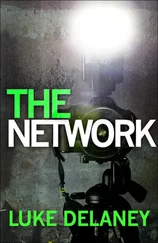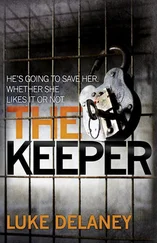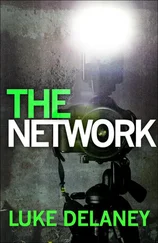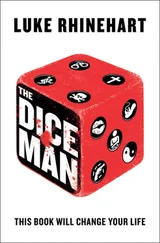Luke Rheinhart - The Diceman
Здесь есть возможность читать онлайн «Luke Rheinhart - The Diceman» весь текст электронной книги совершенно бесплатно (целиком полную версию без сокращений). В некоторых случаях можно слушать аудио, скачать через торрент в формате fb2 и присутствует краткое содержание. Жанр: Современная проза, на английском языке. Описание произведения, (предисловие) а так же отзывы посетителей доступны на портале библиотеки ЛибКат.
- Название:The Diceman
- Автор:
- Жанр:
- Год:неизвестен
- ISBN:нет данных
- Рейтинг книги:3 / 5. Голосов: 1
-
Избранное:Добавить в избранное
- Отзывы:
-
Ваша оценка:
- 60
- 1
- 2
- 3
- 4
- 5
The Diceman: краткое содержание, описание и аннотация
Предлагаем к чтению аннотацию, описание, краткое содержание или предисловие (зависит от того, что написал сам автор книги «The Diceman»). Если вы не нашли необходимую информацию о книге — напишите в комментариях, мы постараемся отыскать её.
The Diceman — читать онлайн бесплатно полную книгу (весь текст) целиком
Ниже представлен текст книги, разбитый по страницам. Система сохранения места последней прочитанной страницы, позволяет с удобством читать онлайн бесплатно книгу «The Diceman», без необходимости каждый раз заново искать на чём Вы остановились. Поставьте закладку, и сможете в любой момент перейти на страницу, на которой закончили чтение.
Интервал:
Закладка:
Terry had apparently undergone an identity crisis as a result of her unusual evening with me and George. Her conversation with the professor of history and with Father Fortes had given her new insights into her Catholic faith, but her sexual experience had not been related, she began to think, to the `greater glory of God.'
She found herself increasingly indifferent to the glory of God and increasingly interested in men. But lust and sex were evil, or so her whole previous life had told her. But Father Fortes had indicated that the Church enjoyed sex. But Father Fortes had turned out to be a psychiatrist, a scientist, a doctor; but they also enjoyed sex. She had felt fulfilled in relieving the loneliness of George X, but after Father Fortes had left it seems George permitted her to relieve his loneliness one more time and then began berating her as a whore and a slut. She found as a result of all this that she could no longer believe in anything. All of her desires and beliefs had been shattered by the emotions of her experimental evening: nothing new was taking its place. All seemed unreliable and meaningless.
Although anxious to begin dice therapy with her, I had to let her pour out her troubles uninterrupted over the first two analytic hours. In the third session - she was still sitting, her legs dangling, staring at the floor - she finally ran out of misery and began repeating that most human of refrains: `I don't know what to do.'
`You keep coming back to the same basic feeling,' I said. 'That all of your desires and beliefs are illusory and meaningless.'
`Yes. I asked for therapy because I can't stand the feeling of emptiness. After that evening I didn't know who I was. When I got you as my therapist last week I thought I must be going insane. Even my emptiness seemed empty.'
She smiled a sad, soft Natalie Wood smile, her eyes-down.
`What if you're right?' I said.
`Pardon?'
`What if your feeling that all desires are unreliable and all beliefs illusions is right, is the mature, valid vision of reality,
and the rest of men are living under illusions which your experience has permitted you to shed?'
`Of course, that's what I think,' she said.
`Then why not act upon your belief?'
The smile left her face and she frowned, still not looking at, me.
`What do you mean?'
`Treat all of your desires as if they had equal value and each of your beliefs as if it were as much an illusion as the
next.'
`How?'
`Stop trying to create a pattern, a personality; just do whatever you feel like.'
`But I don't feel like doing anything; that's the trouble.'
'That's because you're letting one desire, the desire to believe strongly and be a clearly defined person, inhibit the rest
of your various desires.'
'Maybe, but I don't see how I can change it.'
`Become a dice person.'
She lifted her head and looked up into my eyes slowly and without emotion.
`What?'
`Become a dice person,' I repeated.'
`What do you mean?'
`I,' I leaned forward with appropriate gravity, `am the Dice Man.'
She smiled slightly and looked away and to the side.
`I don't know what you're talking about.'
`You believe that each of your desires is as arbitrary, meaningless and trivial as the next?'
`Yes.'
`In some sense it makes absolutely no difference what you do or don't do?'
'That's exactly it.'
`Then why not let the flip of dice - chance - decide what you do?'
She looked up again.
Is that why you keep changing roles and acting so strangely?'
'Partly.'
'You let . . . chance . . , a pair of dice decide your life?'
`Within limits, yes.'
'How do you do it?'
For the first time her eyes brightened. Legs dangling, she listened intently as I explained briefly my option-creating,
dice deciding life.
`My God,' she said when I had finished. She stared some more. `That's wonderful.'
She paused. `First you were a professor of history; then Father Forbes, then a lover, a pander, a psychiatrist, and now
you're - the dice man.'
My face was aglow with triumph.
'Actually,' I said, `I work for "Candid Camera."
Terry paled: it took two minutes for me to reassure her that I'd been joking. When she'd recovered or seemed to have
recovered, she smiled her soft smile, looked up at me, grinned and then began giggling. She giggled for about two
more minutes and stopped. She took a handkerchief from a pocket in her suit jacket and wiped away the tears. Biting
at her lower lip but trying to look me in the eye, she said quietly: `I think I might like to try to be a - dice woman.'
`It will be good for you,' I said.
`It can't be any worse.'
`That's the spirit.'
As a matter of fact Terry and I got nowhere at first. She was too apathetic and skeptical to obey dice decisions except
in the most perfunctory way. Her apathy led her to create unimaginative options, or, when I pressed her to be more
daring, to disobey the die.
It was almost two weeks later that we finally had a session, which led to her breakthrough into belief in the dicelife.
She was the one who got to the core of the problem `I … I'm having trouble … believing. I have to have … faith, but I
don't…'
She trailed off.
`I know,' I said slowly. `The dice-life is related to having faith, to religion, to genuine religion.'
There was a silence.
`Yes, Father,' she said, and gave me a rare smile.
I smiled back at her and continued `A healthy skepticism is an essential ingredient of genuine religion.'
'Yes, Father,' she said, still smiling.
I leaned back is my chair. `Maybe I ought to preach to you.'
I flipped a die onto the desk between us. It said yes to the lecture. I frowned.
`I'm listening,' she said as I continued my pause.
`This may sound Father Forbesish, but who am I to question the will of the Die?'
I stared at her and we both looked solemn. `Christ's message is clear: you must lose yourself to save yourself. You
must give up personal, worldly desires, become poor in spirit. By surrendering your personal will to the whim of the
die you are practicing precisely that self-abnegation prescribed in the scriptures.'
She looked at me blankly as if listening but not understanding.
`Do you see,' I went on, `that the only selfless action is one not dictated by the self?'
She frowned.
`I can see that following the dice might be selfless, but I thought the Church wanted us to overcome sinfulness on our
own.'
I tipped forward and stretched forth an arm to take one of Terry's little hands in my own. I felt - and naturally looked
totally sincere in what I was saying.
`Listen carefully, Terry. What I'm about to say contains the wisdom of the world's great religions. If a man overcomes
what he calls sinfulness by his own willpower, he increases his ego-pride, which, according to even the Bible, is the
very foundation stone of sin. Only when sin is overcome by some external forces does the man realize his own
insignificance; only then is pride eliminated. As long as you strive as an individual self for the good, you will either
have failure - and an accompanying guilt - or pride, which is simply the basic form of evil. Guilt or pride: those are the
gifts of self. The only salvation lies in having faith.'
`But faith in what?' she asked.
`Faith in God,' I answered.
She looked puzzled.
`But what happened to the dice?' she asked.
`Look. I'm going to read a passage to you from a sacred book. Listen carefully.'
I reached into my desk and brought out some notes I'd been making lately in connection with my evolving dice theory
and, after browsing a half-minute to find what I was looking for, I began reading. ` "Verily it is not a blasphemy when I teach: Over all things stand the heaven Accident, the heaven innocence, the heaven Prankishness, the heaven Chance. And Chance is the most ancient Divinity of the world, and behold, I come to deliver all things from their bondage under Purpose and to restore on the throne to reign over all things the heaven Chance. The mind is in bondage to Purpose and Will, but I shall free it to Divine Accident and Prankishness when I teach that in all, one thing is impossible: reason. A little wisdom is possible indeed, just enough to confuse things nicely, but this blessed certainty I have found in every atom, molecule, substance, plant, creature or star: they would
Читать дальшеИнтервал:
Закладка:
Похожие книги на «The Diceman»
Представляем Вашему вниманию похожие книги на «The Diceman» списком для выбора. Мы отобрали схожую по названию и смыслу литературу в надежде предоставить читателям больше вариантов отыскать новые, интересные, ещё непрочитанные произведения.
Обсуждение, отзывы о книге «The Diceman» и просто собственные мнения читателей. Оставьте ваши комментарии, напишите, что Вы думаете о произведении, его смысле или главных героях. Укажите что конкретно понравилось, а что нет, и почему Вы так считаете.












